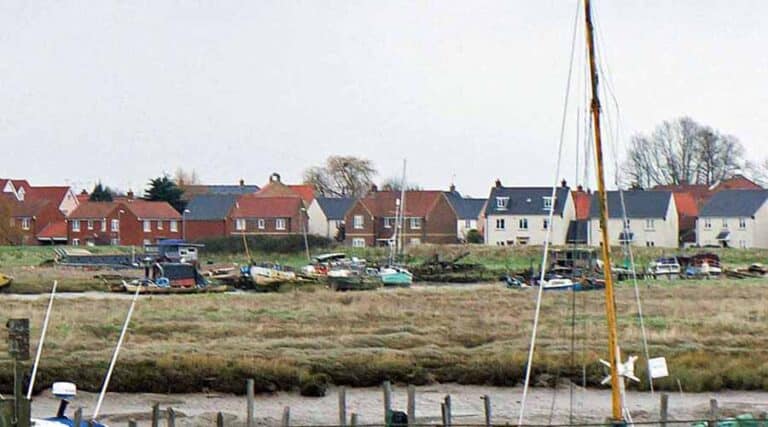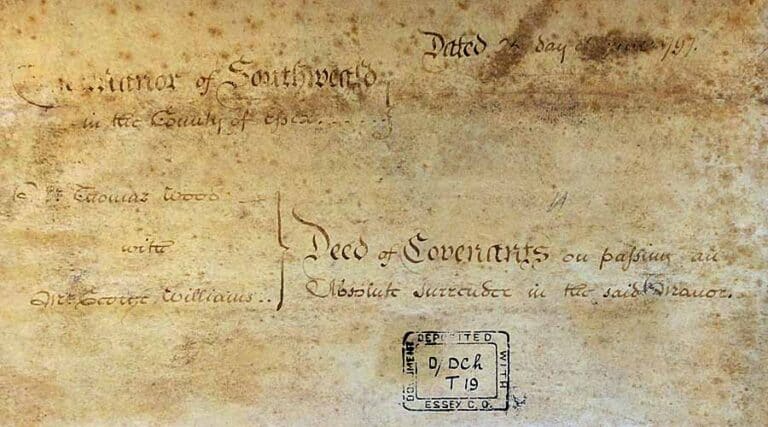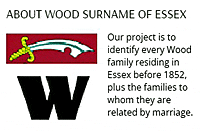Today the Researcher’s Corner discusses the distribution of the Wood surname in England. The Wood families of Essex during the 17th and 18th centuries were somewhat autonomous from the large population of Wood families in the north of England.
North and South Regions
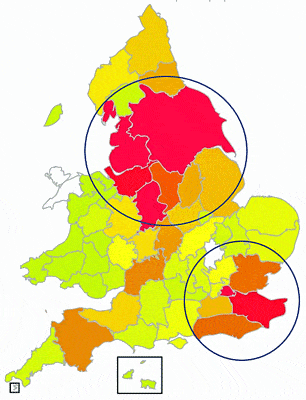
In the 19th and 18th centuries, the Wood surname was bimodal. Bimodal means a graph of data has two peaks. Using non-statistical language, the average person might say the Wood surname was not concentrated in one location but was found in two main areas. Two peaks of statistical data tend to infer two distinct groups.
The distribution map shows a concentration of the Surname Wood in the North and in the Southeast. In the North, 45.4% of all individuals with the surname Wood resided in Yorkshire, Lancashire, Staffordshire, and Cheshire. In the Southeast, 23.2% of them resided in Middlesex (London), Kent, Sussex, and Essex. The North and Southeast regions account for more than two-thirds of people in England with the Wood surname on the 1841 census.
An Enclave
Another way of interpreting the census data is to calculate individuals with the Wood Surname per square kilometer. The data shows the density of the Wood surname in the North and Southeast is approximately the same, while the density in Essex is much lower than either region. Expressed numerically, the North has one person per km2 (0.99) and the Southeast just under one person per km2 (0.91). The rest of England has less than 1/5th a person per km2 (0.18). The county of Essex has 1,502 enumerations and 3,969 km2, which calculates to be less than half a person per km2 (0.47). The similar densities of the North and Southeast regions, which persisted during the 19th century, reinforce the perception that the North and Southeast are distinct groups that independently grew over time at about the same rate of change. Moreover, the density of Essex is 50% less than either the North or Southeast regions, which tilts the analysis towards concluding that Essex is an enclave, even within the Southeast region.
Distribution of Spellings
On the 1841 census, the Wood Surname is spelled in 16 different ways. The dominant spellings are Wood, Wade, Wedd, and Weed. Understanding the variant spellings of the surname Wood is not an exact science. Spellings of a surname can vary due to many things such as local dialects, poor penmanship, aural mistakes, and language shifts. There are two basic types of variation: how a surname is spelled (orthography) and how it is heard (phonological awareness). Analysis of variant spellings must at a minimum consider phonetics, distribution, and frequency. In the table, “Match of Wood” shows spelling variance as a percentage and “Frequency of Spelling” is the total enumerations for all counties of England, excluding Wales, Isle of Man, and the Channel Islands.
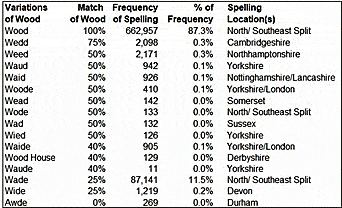
1841 census of English Counties
Soundex
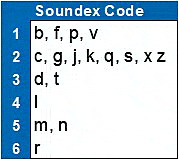 I am guessing that the Soundex code today is not as popular as it used to be because researchers have access to large, clean databases that can search for any exact spelling. Still, the Soundex is useful as an introduction to how surnames are mispronounced and misheard. After all, census records and parish records during the 19th and 18th centuries were created by someone saying their surname and the official writing down what they heard.
I am guessing that the Soundex code today is not as popular as it used to be because researchers have access to large, clean databases that can search for any exact spelling. Still, the Soundex is useful as an introduction to how surnames are mispronounced and misheard. After all, census records and parish records during the 19th and 18th centuries were created by someone saying their surname and the official writing down what they heard.
The Soundex code disregards vowels (a, e, i, o, u and y) as well as the consonants h and w, unless these letters start the surname. The rest of the consonants are divided into six groups. Consonants whose sounds can be confused are assigned the same numeric code. Imagine you are speaking to senior citizens whose hearing is not as sharp as when they were young. For them, the letters in Group 1 (b, f, p, v) are hard to hear correctly. The only two consonants that are not typically confused with another consonant are the l (as in life) and r (as in run).
Wood versus Wade
The perspective of phonetics changes how we hear the surnames Wood versus Wade. In terms of spelling, Wade is only a 25% match with Wood but in terms of the Soundex they are the same W300 code. The Soundex code always starts with one letter followed by three digits. Zeroes are used if the surname lacks enough digits. In the case of Wood or Wade, the code begins with W. Vowels are ignored. The only consonant is d, whose code number is 3. Two zeroes are added because both Wood and Wade only have one qualifying consonant.
In Essex, the 1841 census has 1,502 individuals with the Wood surname and 460 individuals with the Wade surname. If you are looking for a Wood record in a parish that has Wade, you might consider if Wade is really Wood. How to decide? The answer is something like “preponderance of the evidence.” If the frequency of Wade is low and the Wood surname is established in the parish, then the dangling Wade record might be a Wood. Or if the Wade record was created soon after a new parish priest arrived in the parish, the Wade record might be for a Wood.
Research Guidance
Using distribution and frequency patterns for the surname Wood and its variants, we can formulate tentative statements to help guide research.
First, the branch or branches of Wood families in Essex appear, as a general observation, to be an enclave. Of course, there must be exceptions. For example, the Wood family of Ingrave has children who relocated to Yorkshire after 1800. This exception is explained by Catholicism. Many nonconformists cast a wide net to find their spouses.
Second, only 1,502 individuals on the 1841 census in Essex had the Wood surname. The major variant spelling of Wade only had 460 individuals. The total for all other variant spellings is scant, which poses a research challenge to be vigilant to the possibility that individuals with variant spellings of the Wood surname could, in fact, be members of the Wood family. The tricky part is the “preponderance of the evidence.” Due to the small numbers, the starting point is a dearth of evidence. The weight of the evidence must rely on circumstances, such as marriages, witnesses of marriages, land records, and so forth. The variant spellings of the surname Wood in Essex pose a problem that is not straightforward.


